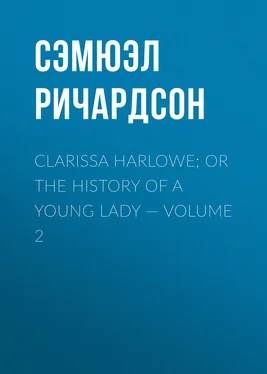'As to the solemn vows and protestations he is so ready, upon all occasions, to make, they have the less weight with me, I tell him, as they give a kind of demonstration, that he himself, from his own character, thinks there is reason to make them. Deeds are to me the only evidence of intentions. And I am more and more convinced of the necessity of breaking off a correspondence with a person, whose addresses I see it is impossible either to expect my friends to encourage, or him to appear to wish that they should think him worthy of encouragement.
'What therefore I repeatedly desire is, That since his birth, alliances, and expectations, are such as will at any time, if his immoral character be not an objection, procure him at least equal advantages in a woman whose taste and inclinations moreover might be better adapted to his own; I insist upon it, as well as advise it, that he give up all thoughts of me: and the rather, as he has all along (by his threatening and unpolite behaviour to my friends, and whenever he speaks of them) given me reason to conclude, that there is more malice in them, than regard to me, in his perseverance.'
This is the substance of the letter I have written to him.
The man, to be sure, must have the penetration to observe, that my correspondence with him hitherto is owing more to the severity I meet with, than to a very high value for him. And so I would have him think. What a worse than moloch deity is that, which expects an offering of reason, duty, and discretion, to be made to its shrine!
Your mother is of opinion, you say, that at last my friends will relent. Heaven grant that they may!—But my brother and sister have such an influence over every body, and are so determined; so pique themselves upon subduing me, and carrying their point; that I despair that they will. And yet, if they do not, I frankly own, I would not scruple to throw myself upon any not disreputable protection, by which I might avoid my present persecutions, on one hand, and not give Mr. Lovelace advantage over me, on the other—that is to say, were there manifestly no other way left me: for, if there were, I should think the leaving my father's house, without his consent, one of the most inexcusable actions I could be guilty of, were the protection to be ever so unexceptionable; and this notwithstanding the independent fortune willed me by my grandfather. And indeed I have often reflected with a degree of indignation and disdain, upon the thoughts of what a low, selfish creature that child must be, who is to be reined in only by the hopes of what a parent can or will do for her.
Конец ознакомительного фрагмента.
Текст предоставлен ООО «ЛитРес».
Прочитайте эту книгу целиком, купив полную легальную версию на ЛитРес.
Безопасно оплатить книгу можно банковской картой Visa, MasterCard, Maestro, со счета мобильного телефона, с платежного терминала, в салоне МТС или Связной, через PayPal, WebMoney, Яндекс.Деньги, QIWI Кошелек, бонусными картами или другим удобным Вам способом.
See Letter XLII. of Vol. I.
Ibid.
See Letter XL, ibid.
See Vol. I, Letter XXXVII, for the occasion; and Letters XXXVIII. and XL. of the same volume, for the freedom Clarissa apologizes for.
Henry VII.
See Vol. I. Letter XXVIII.
Spectator, Vol. VIII. No. 599.
Perhaps it will be unnecessary to remind the reader, that although Mr. Lovelace proposes (as above) to Miss Howe, that her fair friend should have recourse to the protection of Mrs. Howe, if farther driven; yet he had artfully taken care, by means of his agent in the Harlowe family, not only to inflame the family against her, but to deprive her of Mrs. Howe's, and of every other protection, being from the first resolved to reduce her to an absolute dependence upon himself. See Vol. I. Letter XXXI.
See Vol. I. Letter XXXVI.
These violent measures, and the obstinate perseverance of the whole family in them, will be the less wondered at, when it is considered, that all the time they were but as so many puppets danced upon Mr. Lovelace's wires, as he boasts, Vol. I. Letter XXXI.












